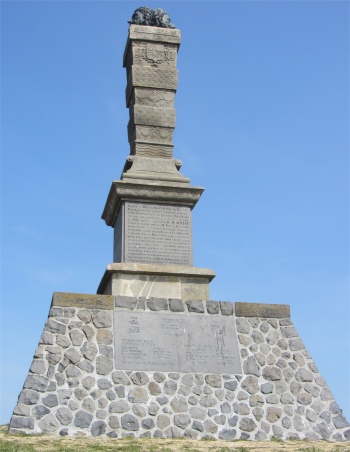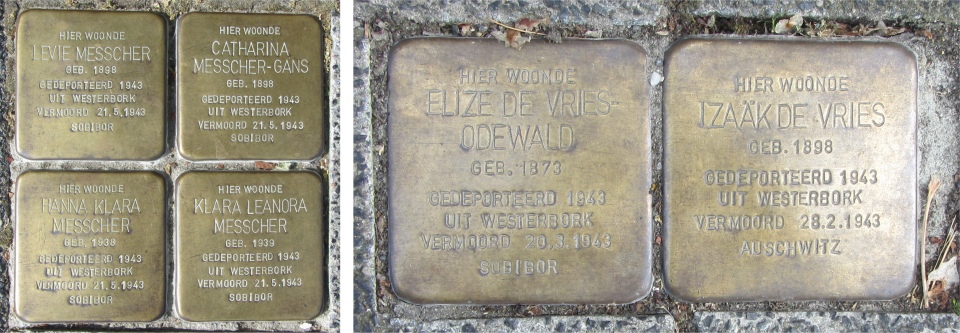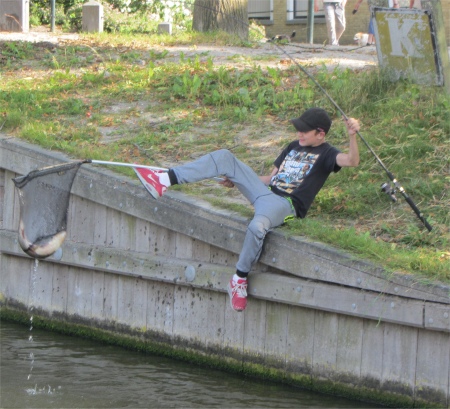 Solar Powered Boat |
I agreed, and asked him if I should pay the 8 Euros for the facilities now. He looked at me, shrugged his shoulders, then with a beaming smile said, "It's alright Dave, you can have this one on me."
"What, are you sure?" was my blurted response.
"Yes, you have been here many nights so don't worry about it," he replied. That was very kind of him I thought.
Later in the morning we headed off to a doctor's by the Noorderhaven for Rex to make an appointment. "09:50 tomorrow morning," was the receptionist's prompt response. After a quick shop, followed by a salad lunch, I toddled off to return the laundrette key to Wilhelm.
He was in the communal canteen chatting with the bridge operator. I learned he had been busy in the morning attending the large garden at the entrance to the marina. "It used to be a car park with room for twenty cars. People on the boats could drive down with all their equipment and park for free," he informed me. "Then the Board of Directors decided to turn it into a garden."
"I'm the only paid person in the marina," he continued, "all the rest are volunteers."
"Are you a volunteer?" I asked the bridge operator, who I discovered had no knowledge of English.
Wilhelm answered on his behalf, "Yes, he operates the bridges, weeds the paths, helps with the garden etc. We have many volunteers. Most of the boats here belong to Harlingen people, and most of the owners help out with the volunteering. But they have lives of their own, so it is not always easy to get help. The canteen here is open to marina users on Friday evenings from 9pm until no more drinks are being bought, and that has to be run by volunteers too."
"Is the Board of Directors taking a fair share of the proceeds from the marina?" I enquired.
"No, they are all volunteers too: a teacher, a shopkeeper, an engineer etc."
"So what happens to all the money that you collect?" was my next question.
"A lady volunteer takes it all and places it into a bank account. Then if our engineer needs a new boiler say, he sees her and she writes out a cheque for it."
"We have 108 berths here, and most of them are rented by the year by Harlingen people. They pay 23 Euros per metre length of the boat, plus 40 Euros for being a member of the marina," he added.
"That's cheap," I said. "Rex has found a cheap marina at Amstelmeer where he intends leaving the boat for a while."
 De Stenen Man |
Rex and I took a long stroll in the afternoon along the promenade from the ferry terminal. A group of lads were jumping into the lock from quite a height. The lock keeper was not amused and reprimanded them, to no avail. In a short space of time two policemen rode up on their bikes and proceeded to have lengthy conversations with the lads. That seemed to do the trick.
We walked past the recently built Harlingen Haven train station, obviously built to accommodate the huge numbers of folk using the ferry terminal, and gazed down at a row of beautiful white cottages festooned with Hollyhocks, which looked out across a busy ring-road, the rail track and the towering promenade, also constructed at the same time as the train station. At one time they would have had a more pleasant view.
The promenade brought us eventually to a dyke, the Westerzeedijk, that stretched far to the south. A vast sandy beach lay between it and the Waddenzee that was far out. Families and groups of youngsters frolicked in scattered groups across the expanse, some even venturing into the sea. We walked along a paved way which stretched along the base of the dyke, passing a monument, "de Stenen Man", The Stone Man. After the All Saints Flood on 1st November 1570, a large portion of the dykes around Harlingen were damaged. The then town holder of Friesland, Caspar de Robles, organised the Frisians to restore the dykes. Westerzeedijk was completed in 1575. Over the course of time the statue acquired the functionality of a stork. Mothers-to-be made a habit of sending their children to the seaside, with the message that, if they walked three times around the stone man, a brother or sister would soon come along. This became a tradition.
Not far past the monument stood an isolated cafe/restaurant that offered a magnificent view across the expanse. Obviously we had to take a seat, enjoy a beer and take in the view.



